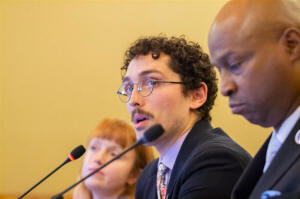House approves framework allowing legislative staff to unionize
 Send a link to a friend
Send a link to a friend
[October 26, 2023]
By HANNAH MEISEL
Capitol News Illinois
news@capitolnewsillinois.com
 SPRINGFIELD – Democrats in the Illinois House on Wednesday approved a
measure to allow certain legislative staffers to unionize, following in
the recent footsteps of lawmakers in California and Oregon. SPRINGFIELD – Democrats in the Illinois House on Wednesday approved a
measure to allow certain legislative staffers to unionize, following in
the recent footsteps of lawmakers in California and Oregon.
House Bill 4148 passed 74-35 and now goes to the Senate, where leaders
have not yet revealed whether they plan to take it up during lawmakers’
two-week fall session. The vote was the only significant action the
House took this week before leaving Springfield and canceling Thursday’s
session.
Since last year, staff members under House Speaker Emanuel “Chris”
Welch, D-Hillside, have been seeking voluntary recognition for their
union in order to negotiate on wages, hours and other working
conditions.
Read more: Welch introduces bill to allow legislative staff to unionize
The Illinois Legislative Staff Association went public with its union
drive this spring, followed by months of criticizing the speaker for
allegedly refusing to engage with the effort. But last month, Welch
announced he supported the staffers’ pursuit and introduced a bill to
change current state law that labor experts say specifically prohibits
legislative staffers from unionizing.

In a committee hearing Tuesday, Welch sat side by side with the staffers
as he presented the bill. The panel also heard from a pair of witnesses
who testified that voters’ approval last year of the “Workers’ Rights
Amendment” to the state constitution didn’t change the Illinois Public
Labor Relations Act’s exclusion of legislative employees from the right
to unionize.
Read more: Illinois House Speaker’s staff could test limits of Workers’
Rights Amendment
“But the amendment does not establish the framework under which that can
be done,” said Mark Bennett, a lawyer at Chicago-based firm Laner Muchin,
which specializes in labor law.
During debate on the bill Wednesday, Welch told the story of his family
voting to remain in the suburbs of Chicago after his father, a union
factory worker, was told his company was moving to Georgia – a
right-to-work state where he could’ve kept his job but would no longer
be unionized.
“He had to work two full-time jobs to make the same amount of money he
made in one union job,” Welch said of his father. “I can tell you why I
believe in unions…Because unions have always provided a path for people
to do better. A path to the middle class. I saw what it did for my
family.”
Republicans largely voted against the measure, save for four who voted
“present.” Before ultimately voting no, Rep. Ryan Spain, R-Peoria, said
he hoped a union contract might curtail the number “all-nighters” the
General Assembly had grown accustomed to pulling in recent years when
passing major legislation including state budgets and criminal justice
reforms.
[to top of second column]
|

Brady Burden, a member of the Illinois Legislative Staff Association
organizing committee, is pictured with House Speaker Emanuel “Chris”
Welch in a Tuesday morning committee hearing. (Capitol News Illinois
photo by Jerry Nowicki)

“In my opinion (they) have not resulted in very good outcomes at a
policy level, and they certainly weren’t (a) very good environment for
our staff to work,” he said.
In a statement Wednesday, a representative of the union organizing
effort said that while there are still details to iron out, the group is
confident that “any differences are within reach.”
“We are appreciative of the lines of communication Speaker and his aides
have opened, and hope to cultivate a similar relationship with President
Harmon and his team going forward,” ILSA organizer Brady Burden said.
Remaining points of contention include whether there would need to be a
separate union for staff from each of the four legislative caucuses, and
if staffers would be allowed to strike during legislative session days.
Currently, the bill prohibits strikes during months when legislative
days are scheduled.
In an interview Tuesday, Burden said a strike would always be a last
resort for the union.
“People don't like to strike,” he said. “You are forfeiting pay. You're
putting yourself out there.”
“So the idea that restricting when we can – basically dictating – when
workers can or can't strike doesn't really make much sense to us,” he
added.
Earlier this month, California Gov. Gavin Newsom signed a measure
allowing legislative staff to unionize there after years of stalled
efforts. Oregon became the first state to allow such organizing in 2021,
though Maine has allowed nonpartisan legislative employees the right to
unionize for more than two decades.
Similar legislative staff union drives in New York, Washington,
Massachusetts, Minnesota and New Hampshire are in various stages of
organizing.
Capitol News Illinois’ Jerry Nowicki and Peter Hancock contributed.
Capitol News Illinois is a nonprofit, nonpartisan news
service covering state government. It is distributed to hundreds of
newspapers, radio and TV stations statewide. It is funded primarily by
the Illinois Press Foundation and the Robert R. McCormick Foundation,
along with major contributions from the Illinois Broadcasters Foundation
and Southern Illinois Editorial Association.
 |